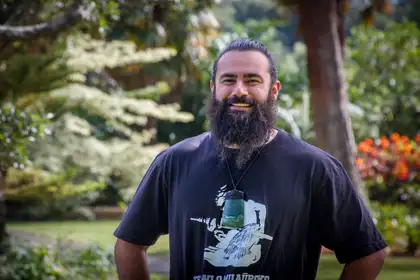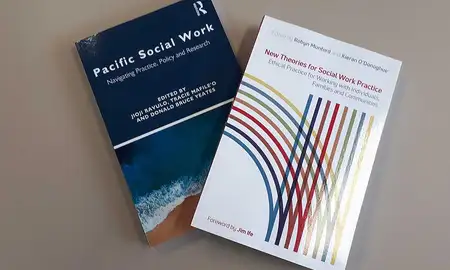
Deacon Fisher is an Assistant Lecturer and PhD student within Massey's School of Social Work.
E ngā mātāwaka nō te mata o te whenua, koutou ngā mata o rātou mā kua rere arorangi ki Matariki, tēnei ka mihi, tēnei ka tuku whakamiha ki a koutou i tēnei rā o ngā tauwhiro o te ao. Tēnā koutou katoa.
World Social Work Day on 21 March both acknowledges and celebrates the tireless work of social workers across a myriad of diverse environments around the globe.
Social workers are no strangers to responding to global challenges. Whether it be implementing the COVID-19 response plan, delivering resources and support to those involved in the Russia-Ukraine war, or advocating for sustainable outcomes to combat climate change, social workers are at the core of eliciting positive change within our communities. Across all these events, altruism informs and guides the delivery of social work practice, working toward attaining constructive social justice outcomes.
Recent challenges at a local level have illustrated the ability of our communities to rally together. As Aotearoa New Zealand continues to recover from the effects of Cyclone Gabrielle, we are reminded of the need to be generous, considerate, and kind – values which bind us and make us human.
Social workers, Whānau Ora navigators, youth workers, community workers, iwi representatives, marae committees and more gathered together to collaboratively identify and implement resolutions, and that is forever worthy of acknowledgment and appreciation.
Our thoughts and love continue to go out to those affected in Te Tai Tokerau, Te Tai Rāwhiti and Te Matau-a-Māui.
‘Respecting diversity through joint social action’ is the theme for World Social Work Day this year.
Diversity creates unique beauty which shapes our world. It is through diversity that change happens, originating from our communities and diffusing throughout broader society. Social work is diverse, from our practitioners, the whānau we work alongside, to the fields of practices and environments we operate within. It is with respect of this diversity that joint social action results in pragmatic and real-life success.
He Whakaputanga o te Rangatiratanga o Nu Tirene and Te Tiriti o Waitangi provide the platforms for diversity to flourish and thrive within our society. Individual and collective self-determination and autonomy are embellished in the words captured in these founding documents of Aotearoa New Zealand.
Tangata Whenua and Tangata Tiriti join together under Te Tiriti o Waitangi in a relationship of allyship, combining to formulate reciprocity through synergetic action.
Te Kunenga ki Pūrehuroa Massey University embodies this as the first Tiriti-led university in our country. This guiding philosophy permeates through our School of Social Work and College of Health, where Massey students and graduates of social work emerge determined to positively and sustainably affect the lives of our most vulnerable populations - a philosophy which encourages continued scholarship and activism for fair and equitable outcomes for everyone.
E ngā tauwhiro, e mahi ana e tau ai ngā mahi a Whiro i tēnā pito, i tēnā pito o te ao whānui, e rere ana ngā tai o mihi, ngā tai o whakamānawa ki a koutou me wō koutou whānau. He rau ringa, he rau waewae e oti ai te mahi.
Deacon Fisher is an Assistant Lecturer and PhD student within Massey's School of Social Work.
Related news
Social Workers work tirelessly to better Aotearoa New Zealand
This National Social Workers Day, Professor Kieran O'Donoghue reminds us of the essential work that this profession does day in and day out.

Celebrating National Social Workers Day
The School of Social Work will be marking National Social Workers Day next week by celebrating the involvement of staff in the publication of two new international social work texts.
